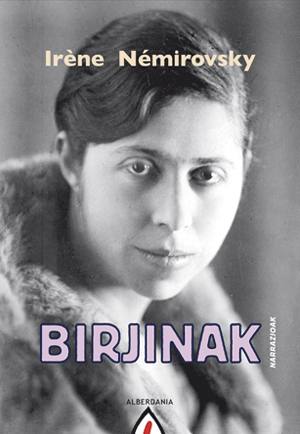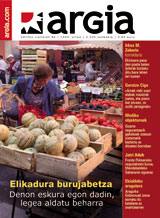Aukeran novel
- Virgins. Irène Némirowsky. Translator: José Antonio Sarasola. Alberdania. 240 pages. EUR 20.

make up the book were published in journals of the time, and the last of them, Birjinak (1942), has been the winner of the space to crown the title of this collection. The remaining reports were kept in the manuscript until its publication in 2009. The
Virgins, no doubt, is the champion of the famine and Zine mintzatua (1935) is the second place. It includes the writer’s conception of real life and destiny that is based on total grief and misfortunes; “we want to live with all our forces or we want peace” (170. pag. ), will say one of the women protagonists of the story. The injured and corrupted characters indicate that it is not useful to try to avoid misfortune, it is better to look in the eyes and face. A well-cooked life is not a real life.
I've had the opportunity to experience various sensations from one story to another. Some twenty pages, some ten pages or five pages, but it has not been a matter of length of stories. Throughout the reading of the book, I've noticed a lot of ups and downs, and the feeling that invades me is that of boredom. In a novel, the boredom between ten pages doesn't have to make us destroy the whole novel, but it does in the case of stories. This is what happened to me with stories like Mamuak, The Unknown and Magic, I have read them without any appeal. The stories of Némirovsky are based on personal experiences, but they are endowed with a broad ontological universal transcendence. In this sense, it cannot be denied depth in terms of content. However, although the reflection on the fabric of life with which we weave our destiny is not too heavy, reading twelve stories that carry the same burden is too heavy. Perhaps it is the right way to start from the novel, and if so, I recommend it to you.
EMEADEDEI + MAHL KOBAT
WHEN: February 2nd.
IN WHICH: In the youth center of Zuia, Murguía.
----------------------------------------------------
On September 20 of last year, we first heard about collective music in the profile of the social network they had just created:... [+]
Otsailaren 13a Torturaren Kontrako eguna izanki, Euskal Herriko Torturaren Sareak gutun publiko bat igorri du. Poliziek torturatu euskal jendeen lekukotasunak bildu, eta aitortza egiteko xedea du sare berri horrek Euskal Herri osoan. Torturatuak izan diren 5.000 pertsonei... [+]
Epistemology, or theory of knowledge, is one of the main areas of philosophy, and throughout history there have been important debates about the limits and bases of our knowledge. Within this we find two powerful corridors that propose different ways of accessing knowledge: The... [+]











_2.jpg)




.jpg)





